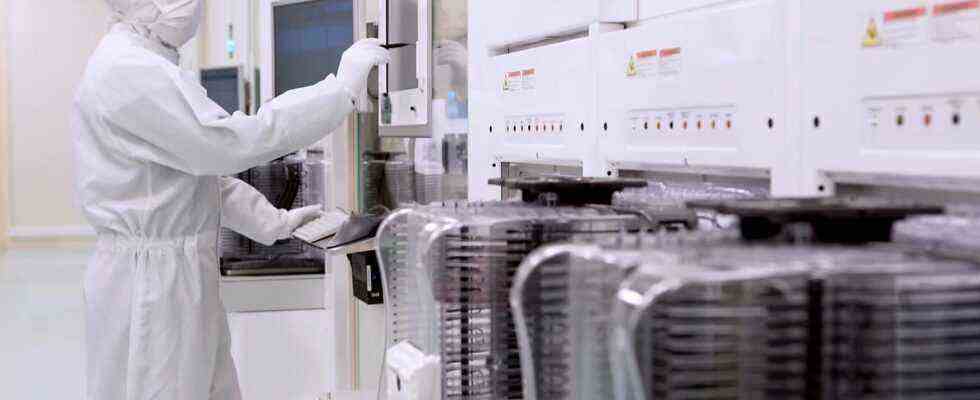Status: 02/01/2022 08:30 a.m
The billion-dollar deal between the German semiconductor company and the Taiwanese Globalwafers does not materialize. The deadline for the takeover ended today – without the green light from the Ministry of Economic Affairs.
The German semiconductor specialist Siltronic will not be sold to Taiwan. This is the end of a month-long process in which Globalwafers from Taiwan had obtained almost all the necessary permits. Only that of the German authorities was missing in the end.
The legal deadline for this ended on Tuesday night at midnight, but the Federal Ministry of Economics and Climate Protection did not grant the necessary approval. The deal, in which Siltronic was valued at 4.4 billion euros by the Taiwanese group, is now off the table. Siltronic employs around 4,000 people and produces in Freiberg, Saxony, among other places. The largest plant is in Singapore. According to Globalwafers, it is the largest wafer supplier in Europe.
Conditions imposed by Chinese antitrust authorities
“By the end of this period, not all the necessary review steps could be completed as part of the investment review,” said a ministry spokeswoman. “This applies in particular to the examination of the antitrust approval by the Chinese authorities, which was only granted last week.” The Chinese competition authority only approved the transaction on January 21.
The conditions that were demanded may have played a role in the “non-decision” by the German side: Globalwafers would have had to sell its zone drawing business within six months – a manufacturing variant for silicon wafers. In addition, the group should continue to supply Chinese customers. The Federal Ministry of Economics wanted to examine these conditions more closely.
New reporting requirements
A so-called “foreign trade clearance certificate” would have been necessary for a takeover. It is checked whether a foreign investment in domestic companies can be expected to adversely affect public order or security in the Federal Republic. The legal basis for this is the Foreign Trade Ordinance, which has been tightened since last year. It contains new reporting requirements for investments in high and future technology sectors. These include, for example, the areas of artificial intelligence, autonomous driving, robotics, semiconductors and cyber security. The test procedure had become legally irrelevant when the deadline expired, according to the spokeswoman for the ministry.
Globalwafers reacted disappointed. “Of course, we want to continue to work closely with our European customers, many of whom have supported the proposed transaction.”
Do not sell “silverware”.
Politicians from both the government camp and the opposition camp approve of the decision by the Ministry of Economic Affairs. The Vice-Chairman of the Economic Committee, Hannes Walter (SPD), claims to be behind the decision: “We don’t gain technological sovereignty by selling our silverware,” the politician told the “Handelsblatt”. The economic policy spokeswoman for the Union faction, Julia Klöckner, told the newspaper: “Germany is an attractive investment location. That’s why it’s right that we also keep our security interests in mind.”
Tangible concerns are likely to have played a role in the fact that the Ministry did not issue a clearance decision. The current shortage of chips in global industry, which is slowing down the production of goods worldwide, shows the outstanding economic importance of chip production in Germany and Europe. Experts fear too much dependence on foreign companies, which could have a negative impact on the domestic economy. Powerful chips and microelectronic components are important key technologies for the ministry.
Habeck wants to reduce dependence on Asia
That is why the new Ministry for Economics and Climate Protection under Robert Habeck (Greens) has also started an initiative to strengthen the semiconductor industry in Europe. According to previous reports, the ministry has already selected 32 investment projects from companies in the microelectronics sector to be funded as part of a European project. The projects are to become part of a so-called IPCEI project of the EU. IPCEI stands for “Important Project of Common European Interest”. Generous eligibility criteria apply to projects bearing the IPCEI stamp. The EU Commission decides which projects will be included in the IPCEI project on microelectronics. According to the Ministry of Economic Affairs, the projects now selected have an investment volume of ten billion euros.
Stock markets anticipated failure
The stock market had already lost faith in a takeover of Siltronic in the past few days. The share, which is listed in the TECDAX, closed yesterday at EUR 116. The price had slipped well below that of the Globalwafers offer at around 128 euros. Before the takeover bid, the share was listed at around 108 euros.

